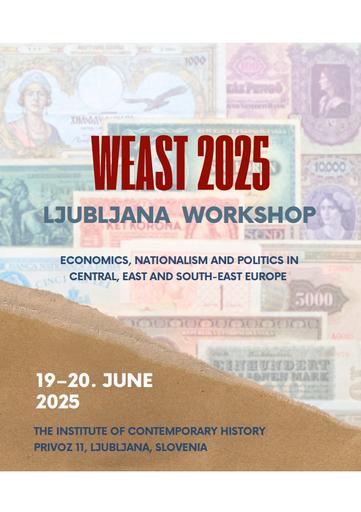/
Dogodki
/
Konference
Wealth inequality of ethnic conflict


To delo avtorja Filip Novokmet je ponujeno pod Creative Commons Priznanje avtorstva-Nekomercialno-Deljenje pod enakimi pogoji 4.0 Mednarodna
Datoteke (1)
Opis
Inequalities have grown in tandem with political conflict. However, the long-standing puzzle is why high economic inequality has been more frequently manifested in identity-based rather than in class-based (or redistributive) political conflicts. This paper contributes to the debate by investigating the relationship between wealth inequality and ethnic conflict—as the most recurrent expression of identity conflict—in the Czech Lands in the first decades of the 20th century. Specifically, we focus on the German areas (the so-called Sudetenland) which were characterised both by high wealth inequality and the emergence of the first German national-socialist parties. We construct uniquely comprehensive measures of wealth inequality at the county level by digitising data of the wealth census of the whole population after WW1 (that accompanied the one-off wealth tax). The data allow us to investigate various dimensions of wealth inequality as it provides detailed wealth breakdowns by specific assets and occupations. We measure political preferences by employing detailed results of parliamentary elections. We show that high wealth inequality was associated with increased vote shares for German nationalists. To corroborate our results, and address potential endogeneity concerns, we employ an instrumental variable approach based on the preWW1 importance of land in the wealth portfolio across the wealth distribution. Concretely, we exploit a WW1 shock to land prices to predict exogenous variation in wealth inequality through the ‘portfolio effect’. The results hold that wealth inequality, rather than increasing support for communists or social-democrats, boost support for proto-Nazi parties. We interpret the results in the framework of the two-issue political competition where class and ethnic cleavages crosscut. We hypothesise that the rich elites supported nationalists to fend off socialist demands. As a placebo experiment, we look also at the areas inhabited mostly by Czechs, where class and ethnic cleavages overlapped. Consistent with the theory, we find evidence that inequalities boost support for social-democrats, but not for extreme right-wing parties. Our findings may help understand the rise of the far-right and the increased salience of ethnic identity in countries with rising economic inequality. We believe that this explains why the reemergence of class-based, redistributive politics has not been observed. The results also contribute to the understanding of the secular rise of extreme nationalism in Europe in the first half of the twentieth century.
Metapodatki (12)
- identifikatorhttps://hdl.handle.net/11686/71119
- naslov
- Wealth inequality of ethnic conflict
- avtor
- Filip Novokmet
- soavtor
- Matthias Morys (mod.)
- predmet
- neenakost premoženja
- etični konflikti
- gospodarstvo
- nacionalizem
- opis
- Inequalities have grown in tandem with political conflict. However, the long-standing puzzle is why high economic inequality has been more frequently manifested in identity-based rather than in class-based (or redistributive) political conflicts. This paper contributes to the debate by investigating the relationship between wealth inequality and ethnic conflict—as the most recurrent expression of identity conflict—in the Czech Lands in the first decades of the 20th century. Specifically, we focus on the German areas (the so-called Sudetenland) which were characterised both by high wealth inequality and the emergence of the first German national-socialist parties. We construct uniquely comprehensive measures of wealth inequality at the county level by digitising data of the wealth census of the whole population after WW1 (that accompanied the one-off wealth tax). The data allow us to investigate various dimensions of wealth inequality as it provides detailed wealth breakdowns by specific assets and occupations. We measure political preferences by employing detailed results of parliamentary elections. We show that high wealth inequality was associated with increased vote shares for German nationalists. To corroborate our results, and address potential endogeneity concerns, we employ an instrumental variable approach based on the preWW1 importance of land in the wealth portfolio across the wealth distribution. Concretely, we exploit a WW1 shock to land prices to predict exogenous variation in wealth inequality through the ‘portfolio effect’. The results hold that wealth inequality, rather than increasing support for communists or social-democrats, boost support for proto-Nazi parties. We interpret the results in the framework of the two-issue political competition where class and ethnic cleavages crosscut. We hypothesise that the rich elites supported nationalists to fend off socialist demands. As a placebo experiment, we look also at the areas inhabited mostly by Czechs, where class and ethnic cleavages overlapped. Consistent with the theory, we find evidence that inequalities boost support for social-democrats, but not for extreme right-wing parties. Our findings may help understand the rise of the far-right and the increased salience of ethnic identity in countries with rising economic inequality. We believe that this explains why the reemergence of class-based, redistributive politics has not been observed. The results also contribute to the understanding of the secular rise of extreme nationalism in Europe in the first half of the twentieth century.
- založnik
- Inštitut za novejšo zgodovino
- datum
- 20. 06. 2025
- tip
- video
- jezik
- Angleščina
- jeDelOd
- pravice
- licenca: ccByNcSa
